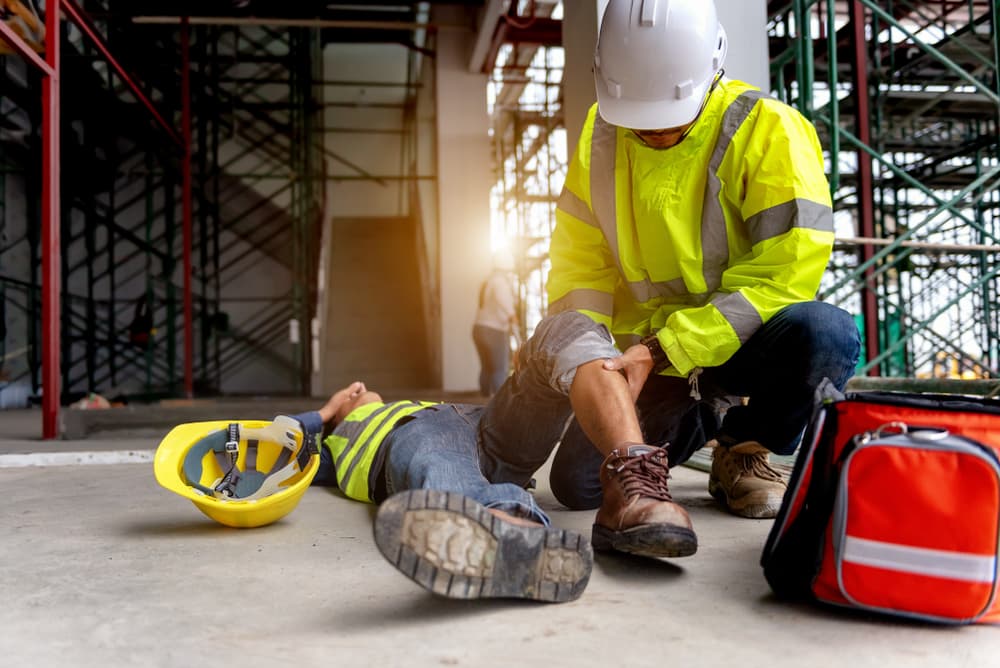If you are a construction worker and have witnessed a severe accident, the emotional distress from what you have seen can change the course of your life. Your expectation may be that the person or company responsible for the accident should have to pay you financial compensation.
Winning a lawsuit for emotional distress alone only happens under certain limited circumstances, yet there may still be ways that you can receive payment.
Some states make it hard for you to recover compensation from emotional distress alone, and as a construction worker, your emotional distress claim may need to accompany a physical injury. However, you should always see a construction accident lawyer to learn whether you have a possible cause of action.
How PTSD Can Impact Construction Accident Victims
Post-traumatic stress disorder results from your experiencing or witnessing a traumatic event. You may experience flashbacks related to what you have seen or deal with intense feelings that can overtake you. PTSD can affect your ability to live your daily life, and you may even be unable to work, mainly when the PTSD results from something that you saw on the job.
PTSD can cause strains in your everyday relationships, and you may experience sudden episodes during the day that can strike you unexpectedly. You can have disturbing thoughts about the incident, especially when you see something that reminds you of what happened.
You may be looking for a way to receive monetary damages for the harm that you have suffered because PTSD can have a quantifiable effect on your life. There are several possible options, although the lawsuit route may be challenging when PTSD is the only injury that you have suffered.
Workers Compensation Benefits Can Cover Your Condition

At the outset, there is always a possibility that you can receive some compensation as a construction worker who is suffering from PTSD after an accident. The workers’ compensation system allows you to receive work-related injury benefits, and the legal definition of injuries is not just limited to the physical. Extreme stress or PTSD should be sufficient for you to qualify for benefits because it is an injury that you have suffered on the job.
Workers’ compensation benefits will pay for the reasonable medical costs related to your condition. They will also pay you two-thirds of your average weekly income, up to a statutory cap. You can receive vocational training for you to perform a new job if the trauma is so severe that you can no longer do construction work.
The Insurance Company May Deny Your Workers’ Compensation Claim Because it is Subjective
Workers’ compensation insurance companies are very strict about paying benefits for non-physical injuries. Trusting you is not in their financial interest, so you will need extensive proof of your condition to persuade them to pay your benefits.
If the insurance company has denied your workers’ compensation claim for PTSD, you can file an appeal. Insurance companies do not get the last word about your benefits, and an objective administrative law judge will hear your case and issue a decision. There are many instances in which a workers’ compensation denial will change to receiving benefits through a successful appeal.
You Should Consider a Personal Injury Lawsuit Because There Is More Compensation
While workers’ compensation benefits are helpful, they do not provide the same compensation as a personal injury claim, as they do not pay for non-economic damages like pain and suffering. In other words, your compensation covers medical treatment and a percentage of your lost income, but not the intangible effects of PTSD that you suffered. Accordingly, you should explore the possibility of filing a third-party personal injury claim.
Even if your employer is responsible for the accident, it is virtually impossible to sue them for PTSD under the laws of any state if you witnessed the accident while working. You can sue the responsible party if they are not your employer, but there are only limited circumstances under which you can successfully file this kind of lawsuit. An experienced construction accident attorney can explore your options for maximum compensation.
You May Not Necessarily Receive Compensation Just By Seeing The Accident
Construction accident witnesses may be unable to recover lawsuit compensation even if they have seen an accident and suffered the effects of it. Emotional distress is not a standalone cause of action for a lawsuit in many states. If you have PTSD from seeing an accident, you must have suffered an injury (even a minor one) to be in a position to receive financial compensation.
Different States Have Their Own Rules About Emotional Distress
The rule about accident witnesses receiving financial compensation depends on the state. Some states do not recognize a general right of bystander recovery for emotional harm that results from what they saw. Construction accident witnesses cannot receive payment for the emotional distress damages they have suffered by seeing the accident.
In other states, bystanders can recover compensation under certain circumstances, but the fact patterns are somewhat limited. Here, the most common events that will support bystander recovery are when someone has been in the zone of danger and witnessed an accident that has severely injured or killed a close relative.
The Elements of Negligent Infliction of Emotional Distress
In these states, the following elements must be met for bystanders to recover for negligent infliction of emotional distress:
- The bystander was near the scene of the accident instead of being a further distance away
- The shock caused a direct emotional impact on the bystander
- There was a sensory and contemporaneous observance of the accident instead of learning about it from someone else
- The bystander and the victim were closely related
In other words, you must have been in the zone of danger, and you must have seen the accident itself or the immediate impact of it. The victim must have been a close relative, such as a spouse, child, or parent.
When Construction Workers Can Sue for PTSD
Some circumstances may support a construction worker receiving compensation for PTSD. While they may not receive payment for witnessing most accidents, they can file a claim for compensation if they see a co-worker severely injured by a defective product. Their fellow construction workers may have suffered an injury after being run over by a defective forklift or severely cut by a machine without proper safety guards. Then, the maker of the product should have reasonably foreseen that others may see and experience emotional distress after seeing a gruesome injury on a job site.
Suing for Emotional Distress Under the Rescue Doctrine
A construction worker can sue for emotional distress under the rescue doctrine if they attempt to rescue an accident victim and end up in emotional distress. The rescue doctrine may even apply when there is no close relationship between the rescuer and the accident victim. Here, the rescuer must take concrete and deliberate steps to save the accident victim instead of merely running to the scene to see if they can help. There must have been a genuine intent to rescue the victim instead of a general desire to do something.
You Must Still Prove Negligence When Suing for PTSD
To recover anything for negligent infliction of emotional distress, you must show that there was negligence in the first place. You will have to show that the defendant:
- Owed the accident victim the duty of care
- Breached the duty of care by doing something unreasonable under the circumstances
- The accident victim suffered an injury
- They would not have suffered an injury had it not been for the actions of the other party
Then, you need to show that you meet one of the recognized reasons that entitle you to financial recovery and often need to prove a physical injury, even if it was slight.
Make Sure to Document Your Case of PTSD Extensively
If you are trying to seek compensation for any emotional distress, you must have your claim documented extensively. The defendant’s insurance company will be challenging to work with when claims involve any subjective condition that relies on personal reports of what you are experiencing. Insurance companies will never trust anything unless they can see it in front of them in writing and will not give you the benefit of the doubt.
Get Mental Health Treatment When You Begin to Experience Symptoms of PTSD

If PTSD is part of your personal injury claim, you should seek treatment from a mental health professional as soon as you can after an accident. If you are suffering from physical injuries, you should get mental health assistance when you are beginning to recover. You will need to be in treatment for some time so you can prove that your condition is persistent and has caused you significant difficulty.
Your treatment provider will document what they have observed after speaking with you and give their impressions of your condition. Then, you will use these records to show that you deserve compensation because they will provide evidence of the severity of your claim.
Financial Compensation for an Emotional Distress Claim
If you can prove compensable emotional distress, you can receive the following damages:
- The medical costs to treat your emotional distress
- The mental anguish that you are experiencing as a result of your emotional distress
- Lost income if your PTSD is keeping you from working
- Loss of enjoyment of life from your PTSD
Calculating intangible losses is an additional challenge. What number should you put on the flashbacks you experience and the fear you feel due to PTSD? Your construction accident lawyer has the experience and tools to determine the value of your losses. Never accept a settlement offer from an insurer without first getting legal advice regarding how much you deserve for PTSD and any other injuries you might have.
Passersby Can Also Witness Construction Accidents
Accidents can happen unexpectedly on construction sights, and it is not uncommon for passersby to witness these incidents firsthand. Whether it’s a significant fall, falling debris, or a crane malfunction, being in the wrong place at the wrong time can have serious consequences.
If witnessing the accident traumatized you and caused lasting mental and emotional symptoms, never wait to seek legal advice. Even if you were simply a witness and not directly involved in the accident, you may still have rights and potential claims. Consulting with a skilled construction accident attorney can help you understand your options and protect your interests.
Don’t underestimate the importance of seeking legal representation after witnessing a construction accident. By taking action and retaining an attorney, you can play a crucial role in holding negligent parties accountable and ensuring that safety measures improve for the future. Remember, you have the power to make a difference. So, if you find yourself witnessing a construction accident, don’t hesitate to seek the help and guidance of a qualified attorney.
Check with a Construction Accident Lawyer to See if You Have a Valid Claim
While it is not always easy for construction accident bystanders to recover financial compensation, you should always check with a lawyer to see if you have a potential case. Your lawyer will review the facts of your situation to see if there is any possibility of receiving financial reimbursement. If your lawyer does not believe you have a strong compensation claim, they will tell you so during your free initial consultation.

Because of the contingency system, a construction accident lawyer will only take your case if they believe that there is a probability that you will receive money. They will not charge you anything for your initial consultation; if the lawyer does not take your case, you will not owe them any money. You will also not need to pay if your lawyer does take the case and you do not receive any financial compensation. Always let a lawyer determine whether you can take legal action.
By consulting a San Antonio personal injury attorney, you will eliminate any doubts or questions about your rights and future after developing PTSD. Contact a firm near you today.
